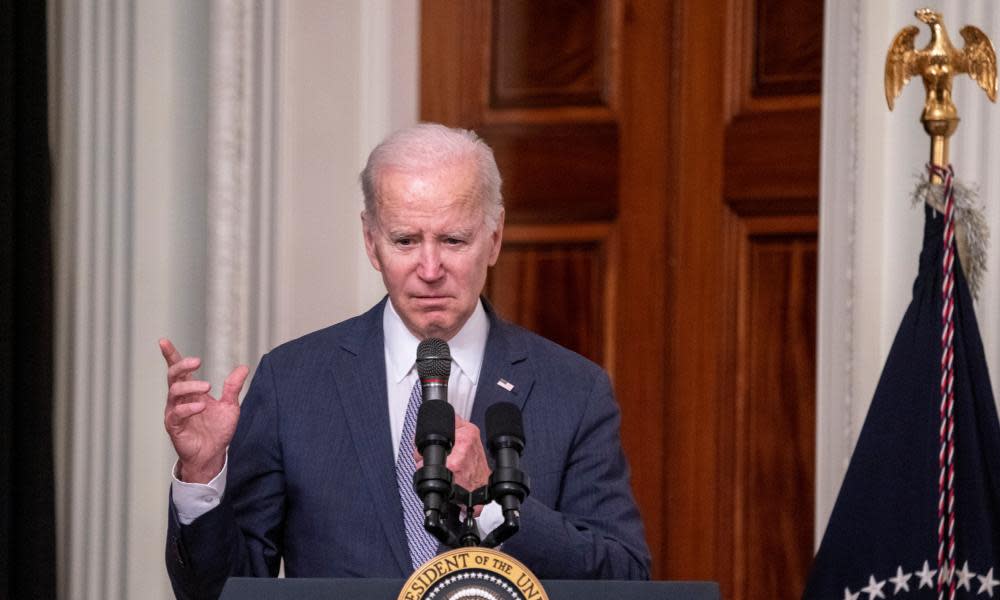Biden waited long to address the mysterious flying objects. Now we know why

After weeks of speculation about a Chinese spy balloon and other weird things in the skies over North America, President Joe Biden on Thursday did what he had to do.
He finally talked about the subject in a formal setting – a brief address to the nation from the White House.
With criticism coming from both Democrats and Republicans about the lack of information being shared with the public after four flying objects were shot down over the past two weeks, Biden really didn’t have any other option.
Americans have been understandably puzzled and unnerved by what was happening, first as the spy balloon was shot down and then as the second, third and fourth objects appeared and were taken down over Alaska, Canada and Michigan.
The president had to say something before another day went by.
But Biden’s roughly eight-minute address didn’t do anyone – including himself – much good. Filled with fuzzy talk of parameters and protocols, and devoid of much useful information, the brief speech made it all too obvious why it took Biden so long.
“Biden’s announcement was underwhelming, to say the least,” tech writer Matt Novak opined in Forbes. It was hard to argue, although it was helpful to hear the president confirm that the US military has adjusted its radar filters, which has led to being able to spot more objects flying about.
Biden didn’t have much more to say, other than that he expected to speak soon with President Xi Jinping of China to object to the original surveillance balloon’s apparent violation of American airspace; it was shot down on 4 February over the Atlantic after being seen over Montana by civilians.
As for the others, “we don’t yet know exactly what these three objects were, but nothing, nothing right now suggests they were related to China’s spy balloon program or that there were surveillance vehicles from any other country,” Biden said.
The other three objects, he added, “were most likely balloons tied to private companies, recreation or research institutions studying weather or conducting other scientific research.”
It sounded plausible but speculative. And that lack of certainty, no doubt, is part of why he hesitated to speak earlier.
Making it worse – in terms of transparency with the press and public – the president didn’t answer any reporters’ questions after his prepared remarks. He hesitated, and seemed to consider responding substantively, as he listened to the cacophony of shouts from the press.
Then he apparently got annoyed after a question (“Are you compromised by your family’s business relationships?”) got under his skin. He snapped at the reporter with a characteristic phrase: “Give me a break, man.” Not long after, he walked away.
It would have been far better to try to identify one or two reasonable questions on the subject at hand and to answer them respectfully – even if it meant saying “we don’t know that yet”.
In a less fraught political environment, Biden might have been wise to heed Senator Chris Coons. A few days ago, the Delaware Democrat sounded as if he had beamed, like Michelle Yeow, into the multiverse and had already experienced Thursday’s non-news event.
“If I were advising the president on this, I’d say ‘wait until you’ve got clarity,’ Coons told reporters. “I wouldn’t just stand up and give a speech to the nation saying ‘We don’t yet know the answer to all these questions,’ because I don’t think that would reassure anybody.”
But that sensible-sounding notion had to be weighed against the predictable nastiness of Republican lawmakers like Josh Hawley of Missouri who said a formal presidential appearance “would at least show me that the president maybe is aware of what’s going on, and is lucid”.
And Coons’ thinking had to be weighed, too, against strong urging from some fellow Democrats, including Senator Richard Blumental of Connecticut: “The American people should be given more information. They’re ready for it. They can handle it. And they need and deserve to know it.”
Given the apparent lack of hard information to be shared, this situation was probably a “damned if you do, damned if you don’t”. Still, it would have been worse to do nothing, and let the criticism continue to mount from all sides.
Hearing from the president directly was moderately worthwhile but the address could have been much more valuable if Biden had thoughtfully responded to a few questions from the gathered press.
If transparency was the major aim, not doing that was a missed opportunity.
Margaret Sullivan is a Guardian US columnist writing on media, politics and culture

 Yahoo News
Yahoo News 
